Express your voice – Conscience vs Ego
This article is about understanding the highest manifestation of human nature when we operate from a higher level of consciousness. It is based on Stephen Covey's whole-person paradigm and its four human elements (body, heart, mind, spirit). The article describes the intelligence related to each element and their manifestation in vision, passion, discipline and conscience. This article puts more attention on the conscience vs ego because it is important for a trainer to increase awareness from the paradigm that he/she operates. The article is an extract from Stephen Covey’s book, The 8th Habit, and it relates to other articles (such as “The whole person paradigm”).

Description:
The Whole Person Paradigm tool (linked) identifies the four elements of human nature (body, mind, heart, and spirit). Corresponding to those four elements are four capacities or intelligence that every human being possesses: physical (PQ), mental (IQ), emotional (EQ), and spiritual (SQ) intelligence.
Mental Intelligence (IQ) – When we speak of intelligence, we usually think in terms of mental intelligence (IQ), that is, our ability to analyze and reason, use language, visualize, and comprehend.
Physical intelligence (PQ) – The capacity of the body, which we mostly underestimate. Just think about what our bodies do without any conscious effort. It runs our respiratory, circulatory, nervous and other vital systems. It is constantly scanning its environment, destroying diseased cells and fighting for survival. Our body is brilliant machinery that outperforms even the most advanced computers.
Emotional intelligence (EQ) – Is one self-knowledge, self-awareness, social sensitivity, empathy and ability to communicate successfully with others. It is having the courage to acknowledge weaknesses and express and respect differences. More on emotional intelligence in the tool
Spiritual intelligence – The central and most fundamental, because it becomes the source of guidance of the other three. Spiritual intelligence represents our drive and connection with the infinite. It helps us discern the true principles that are a part of our consciousness, which are symbolized by the compass. The compass is an excellent physical metaphor for principles because it always points north. The key to maintaining high moral authority is to continually follow the “true north” principles.
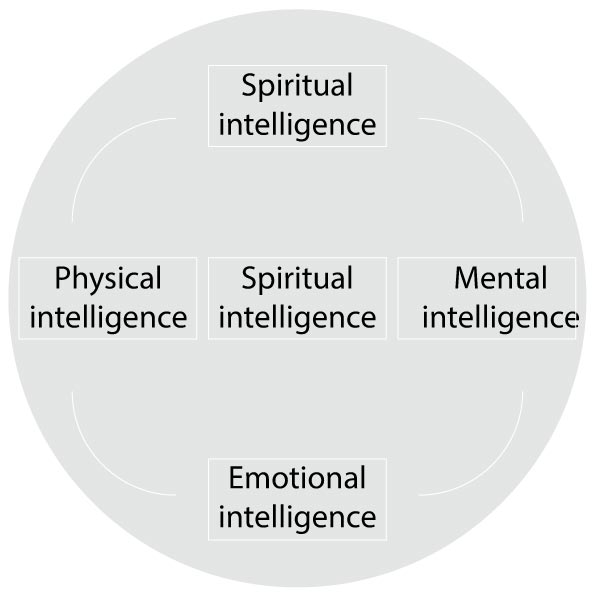
The highest manifestation of these four types of intelligence is: for the mental, vision, for the physical, discipline, for the emotional, passion, for the spiritual, conscience.
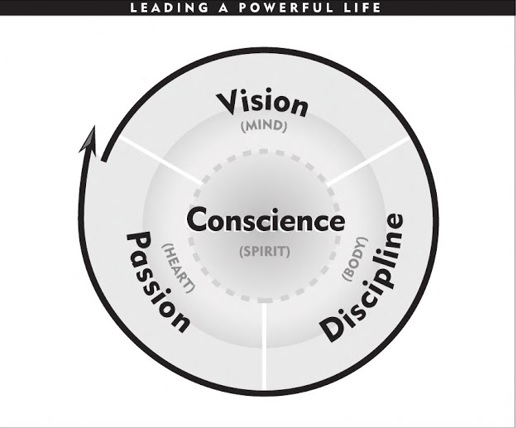

In the picture you can see the characteristics of each element that leads to the manifestation of the vision, discipline, passion, and consciousness.
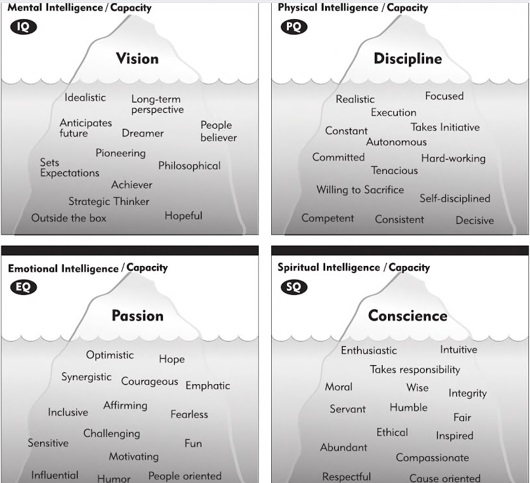
Conscience and Ego
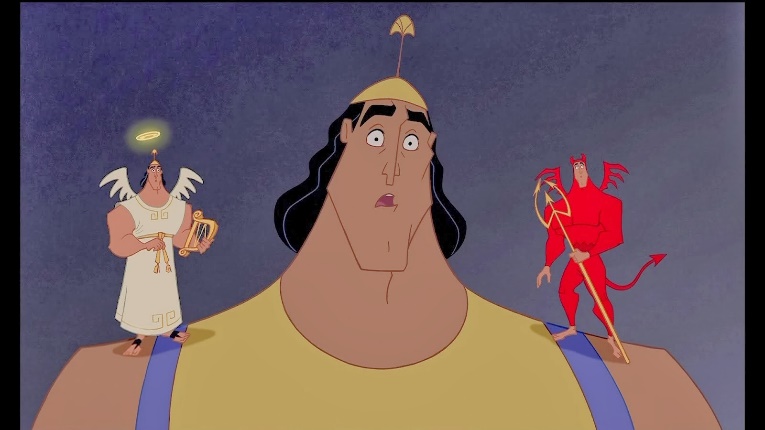
Conscience is the still, small voice within. It is quiet. It is peaceful. Ego is tyrannical, despotic and dictatorial. Ego focuses on one’s own survival, pleasure and enhancement to the exclusion of others and is selfishly ambitious. It sees relationships in terms of threat or no threat. Conscience, on the other hand, both democratizes and elevates the ego to a larger sense of the group, the whole, the community, and the greater good. It sees life in terms of service and contribution, of others’ security and fulfillment. The ego works in the face of a genuine crisis but has no discernment in deciding how severe a crisis or threat is. Conscience is filled with discernment and it has the patience and wisdom to decide what to do when. Conscience sees life on a continuum. It’s capable of complex adaptation.
The Ego can’t sleep. It micromanages and disempowers. It reduces one’s capacity and excels in control. Conscience deeply reveres people and sees their potential for self-control. Conscience empowers. It reflects the worth and value of all people and affirms their power and freedom to choose, then natural self-control emerges, imposed neither from above, nor from the outside.
The ego is threatened by negative feedback and punishes the messenger. It interprets all data in terms of self-preservation. It constantly censors information and denies much of reality. Conscience values feedback and attempt to discern whatever truth it contains. It isn’t afraid of information and can accurately interpret what’s going on. The Ego interprets life through its own agenda. Conscience is a social ecologist listening to and sensing the entire system and environment. It fills the body with light and can democratize the ego to reflect more accurately the entire world.
Conscience is a sacrifice – the subordinating of one’s self or one’s ego to a higher purpose, cause or principle. Sacrifice means giving up something good for something better. Conscience is a sacrifice – the subordinating of one’s self or one’s ego to a higher purpose, cause or principle. Again, sacrifice means giving up something good for something better.
Sacrifice can take many forms as it manifests itself in the four dimensions of our lives: making physical and economic sacrifices (bogy); cultivating an open, inquisitive mind and purging oneself of prejudices (the mind); showing deep respect and love for others (the hearts), and subordinating one’s own will to a higher will, for the greater good (the spirit).
Conscience teaches us that the ends and means are inseparable, that the ends actually preexist in the means. Immanuel Kant taught that the means used to accomplish the ends are as important as those ends. Machiavelli taught the opposite, that the end justifies the means. Consider the seven things that, according to Gandhi’s teaching, will destroy us:
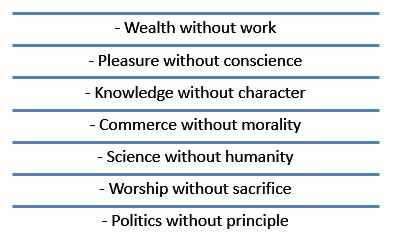
If you study them slowly and carefully, you will see how powerfully, each represents an end being accomplished, through an unprincipled or unworthy means. Conscience constantly tells us the value of both the ends and the means and how they are inseparable.
However, its ego that tells us that the end justifies the means, unaware that a worthy end can never be accomplished with unworthy means. It may appear you can, but there are unintended consequences that are not seen or evident at first that will eventually destroy the end.
Conscience profoundly alters vision, discipline and passion by introducing us into the world of relationships. It moves us from an independent to an interdependent state. You realize that vision and values must be shared before people are willing to accept the institutionalized discipline of structures and systems that embody those shared values. Such a shared vision creates discipline and order without demanding them.
Conscience often provides the WHY, vision identifies WHAT you’re trying to accomplish, discipline represents HOW you’re going to accomplish it, and passion represents the strength of the feelings behind the why, the what, and the how.
Conscience transforms passion into compassion. It develops into sincere caring for others, a combination of both sympathy and empathy, where one’s pain is shared and received.
Finally, when people strive to live conscientiously, it produces integrity and peace of mind.
To summarize, I invite you to think again of this perception about life: a whole person paradigm with four basic needs, four intelligences and their highest manifestation (table below).
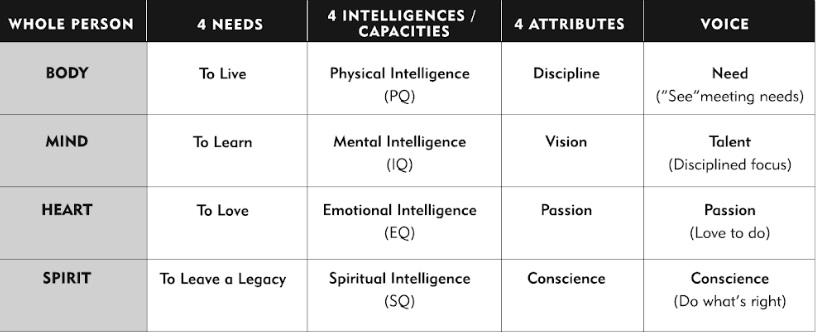
Why did I choose this tool?
This tool gives a simple perspective of human nature and the related needs and highest manifestations. As a framework, it is a useful tool for trainers to reflect on themselves, but also to work and introduce it with other learners. For me, it has been the foundation of my personal development, and I find it very useful when working with young people on the topic of leadership, change agents, values and society. From the civic engagement perspective, it gives a wider understanding of people’s behavior and actions and is a good frame of thinking when reflecting.
Suggested Reflection Questions
What stroke you the most when reading this article?
Think of an example of where you operated from a conscience perspective?
Think of an example of where you operated from an ego perspective?
How did your actions (conscience or ego) affect yourself? On others? How did you feel afterward?
Which areas from the four elements do you think you need to awaken the most?
Exercises
– reflect and journal at the end of the day about situations when your mind operated from ego and consciousness perspective
– at the beginning of the day write down which characteristics you need to exercise during the day that will get you closer to your vision
– think of the people you will meet during the day and prepare yourself to act from a consciousness perspective when they might be operating from an ego perspective
Intuition will tell the thinking mind where to look next
– Dr. Jonas Salk, discoverer of the polio vaccine




